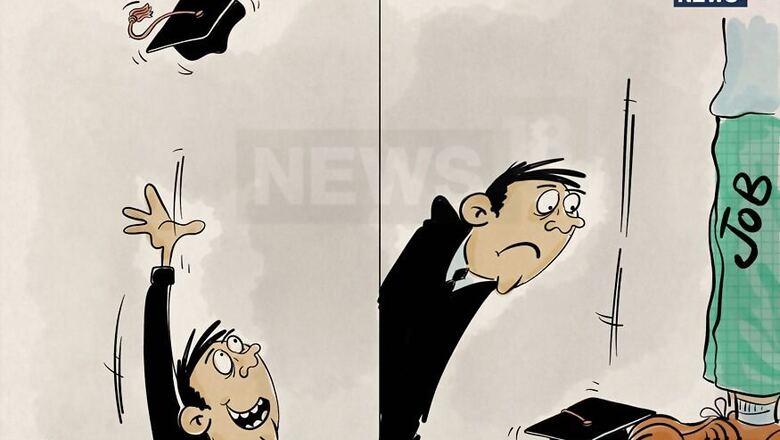
views
Rohit Seth (name changed), 18, usually carries his earphones with him when attending coaching classes for entrance exams. He spends the two hours at a centre in New Delhi’s Kalu Sarai watching Netflix. There’s no teacher to pull him up and he gets the notes after class.
“There will be a note given to us at the end anyway. The class tests are mostly based on those notes. You just need to ‘by-heart’ them. For the main entrance exam, instructors here have told us that if we are able to remember at least 80 percent of the notes, there are high chances of us getting through,” Rohit, a South Delhi resident, said.
Rote learning has become so common that news has now reached the central administrative corridors.
The Ministry of Higher Education, in close consultation with AICTE, the government regulatory body for technical education, is in the last rounds of deliberation to change engineering exam patterns across the country. They feel rote learning is the major reason behind dwindling job count despite students making it through entrances.
“We are working on new question types and question papers for engineering entrance tests and semester exams as well. We had set up an independent committee with All India Institute of Technical Education (AICTE). The report has already come, we are deliberating on it,” an official from the department told News18.com on condition of anonymity.
Currently, India conducts a combined entrance test for engineering colleges at the national level, the Joint Entrance Exam (JEE).
News18.com attended classes in various engineering coaching centres in the national capital to understand the problem more closely. The general practice across most of these centres includes handing out notes at the end of the class to memorise study material.
In the coaching centre at Delhi’s Kalu Sarai, where Rohit watches Netflix, there's a large screen that's attached to a projector. Eighty students sit there watching the screen. They are all trying to chase their B. Tech dream and their hopes are pinned on to that screen.
AICTE chairman Anil Sahasrabuddhe also believes that rote learning is a major problem and students are landing lesser jobs because of it.
“Currently, what is going on is rote learning. Whatever you remember and are able to produce on the answer sheet, you are marked based on that and then you get admission. Unless the student is tested in specific skill sets, we will not be able to judge him,” he said. The AICTE chairman said that they are planning to change this.
Open book examination is one of the major recommendations of the committee. If accepted, this will allow students to take notes, textbooks and resource material inside the exam hall.
Sources in the committee said these reforms are part of the systemic changes that AICTE is undertaking. The government regulatory body also tweaked the engineering curriculum last year. The changes suggested by the committee include introduction of educational experiences to teach and assess professional outcomes, open-ended experiments in laboratories, project-based learning modules and internship experiences, among others.
Two hours after the class began in the coaching centre, Rohit has finished his Netflix episode and has now turned to his neighbour for gossip. Students are starting to get weary. What started as hushed murmurs have now turned into relaxed chats. Apart from entrance exams, the most popular topic is jobs.
“I’ve heard there are lesser jobs in the engineering circuit. But I really want to be an engineer. Possibly, if I do really well in the exams in the college I will surely land a good job. The companies will consider my grades for sure,” said Rohit’s bench-mate.
However, the young aspirant’s take is only partially correct.
News18.com spoke to multiple Human Resource (HR) heads across firms and they had a different opinion. “Students who score well obviously attract attention, but it is limited till there. In order to get hired and secure a good salary, the pass-out must have practical and industrial skills as well. It is not always textual knowledge that works on the field,” said a veteran HR head, refusing to be identified due to company policy.
Waqar Azmi, CEO and founder of SutraHR, a recruitment consultancy also elucidated the need for practical skills. “The student who has done more internships, made multiple field trips and can offer more than textual knowledge stands out and has better chances of getting employed.”
Taking into cognizance the growing need for practical training, AICTE has also made summer internships compulsory across all engineering colleges in the country.
“Summer internships have become mandatory in colleges. It is in good progress. The colleges are signing MoUs with private firms such as Internshala. The trend of providing internships for one full vacation or a semester and tweaking with the curriculum has begun,” said the AICTE chief.
While the Centre recognises the pressing need for practical training for brighter chances of employment, things at this Kalu Sarai’s tuition class just got worse.
The large screen has blacked out. The students can now only hear the teacher.
After four hours of pre-recorded teaching, the coaching centre’s help informs them that it's a 'technical glitch'. "The class cannot be continued further.”
The students are not disappointed. They pick their notes and go back home to memorise everything from there.
(This story is part of News18 series #onthejob. The next installment of the series will explore data-led narratives into the job space and how India is reacting to changing employment avenues.)


















Comments
0 comment